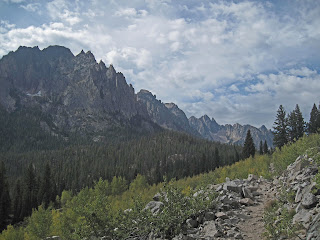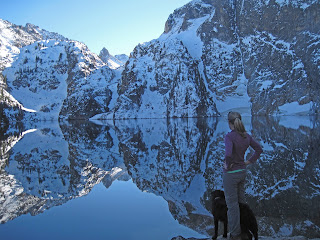In a blog post a little while back, Twitter friend A.S. Akkalon discussed being sorted into Ravenclaw by the Pottermore website. In a comment, I proclaimed that I was also part of the Ravenclaw club. We congratulated each other's high degree of nerdom and moved on.
Why Ravenclaw you might ask? Well, frankly I'm not quite personable enough to be a Hufflepuff, not nearly brave enough to be a Gryffindor, and certainly not evil enough to be a Slytherin. Besides, "Wit beyond measure is man's greatest treasure" is a motto I could get behind any day.
Why Ravenclaw you might ask? Well, frankly I'm not quite personable enough to be a Hufflepuff, not nearly brave enough to be a Gryffindor, and certainly not evil enough to be a Slytherin. Besides, "Wit beyond measure is man's greatest treasure" is a motto I could get behind any day.
 |
| If you aren't a fan of Harry Potter, this entire post will probably seem like nonsense. I apologize in advance for that |
What Potter fan hasn't wondered and even fantasized about what their time at Hogwarts would be like? Would I be a quidditch captain and seeker and end up in front of thousands of cheering witches and warlocks at the Quidditch World Cup? Would I be a troublemaker and romp the castle grounds, probing its every secret passage like Fred and George Weasley? Would I be a clever, clandestine wizard, poking through the restricted section of the library and creating innovative and original magic?
Knowing there was a website, and one officially sanctioned by J.K. Rowling which seemed to lend it some credence, that would actually sort me into my Hogwarts house, how could I resist? I found myself visiting Pottermore for the first time, greedy to discover something of my Hogwarts future.
So the sorting quiz began...
"Your worst nightmare consists of..." "Which animal would you bring to Hogwarts..." "You most want to be remembered as..." The questions rolled on. Though sometimes I found myself stuck between answers (if I interpret it like this I would answer ___ but if I interpret it like that I would answer ___), I provided the most honest answers possible.
 |
| Otis is black but he resents even the implication of evilness |
This strangely vague question of black or white seemed laden with gravity, like my entire Hogwarts experience might hinge on simple semantic interpretation. If it was meant to be figurative, a stand-in for the moral condition of my soul, then of course I would choose white. I like to think of myself as a person of good-intentions. I always side with the hero, not the villain. But from a simple electromagnetic spectrum standpoint (and the three simple words in the question's phrasing gave no indication it was anything else) I would have to say black fits me better.
After too-long deliberating, I chose black and reluctantly hit submit.
The quiz was complete. My Hogwarts schooling career was about to begin. The time had come to find out to which House I belonged.....
SLYTHERIN!!! The Sorting Hat projected into the Great Hall. What?!? How could?!? But I...
I was aghast. I was angry. I was ashamed. Such a torrent of emotion did I experience that I leapt to my feet and paced around my living room until the shock wore off. It had be wrong. There must be some mistake. Somebody hacked into my computer while I was halfway through and supplied some devious, misleading and inauthentic answers. But after a amount of time spent feeling angry and disenfranchised, I had to accept the truth:
The Sorting Hat's decision was final. Like it or not, I was a Slytherin.
I was aghast. I was angry. I was ashamed. Such a torrent of emotion did I experience that I leapt to my feet and paced around my living room until the shock wore off. It had be wrong. There must be some mistake. Somebody hacked into my computer while I was halfway through and supplied some devious, misleading and inauthentic answers. But after a amount of time spent feeling angry and disenfranchised, I had to accept the truth:
The Sorting Hat's decision was final. Like it or not, I was a Slytherin.
 |
| My new family crest, I suppose. The evil-looking snake does nothing to assuage my fear of how I will be received by my Hogwarts colleagues. As a member of another house, would you still be my friend? |
I was stuck with a vision of myself, wary in the corner of the shadowy Slytherin common room, on the fringe of a pack of snaggletoothed Crabbe and Goyle lookalikes, trying not to draw attention while simultaneously trying not to look like I was trying not to draw attention. Somewhere nearby a Malfoy-figure was holding a gathering of the wizarding world's version of the Alt-right and I felt obliged to voice my occasional disingenuous agreement simply in order to ride my broom under the proverbial radar.
Perhaps, however, if while the Sorting Hat rested upon my head, magically penetrating parts of my mind I didn't even know existed, I should have implored it "Not in Slytherin. Not in Slytherin" and it would have taken enough pity on my cause to throw me in Ravenclaw anyway.
I was consoled somewhat by the letter from my new house welcoming me into the noble line of Slytherin. The great wizard Merlin, the letter informed me, was a Slytherin. This is good. I liked the Sword in the Stone. If we are talking about the same iteration of Merlin, I could potentially get behind that.
So do I have some hidden evil in me that the Pottermore Sorting Hat sensed that even I am unaware of? Or perhaps is it that Slytherin gets an unfair reputation based on a few bad examples? Or is it just a silly website and I shouldn't take it so seriously? I never actually put on the actual Sorting Hat, after all. This quiz that functions as a Sorting Hat stand-in surely is little more than a cheap imitation.
Despite this reasonable logic and my numerous appeals to the magical kingdom for justice, however, I had to accept that I was sorted as well as an American muggle can be.
I am a Slytherin.
I am a Slytherin.
NOTE: After this blog post was written, I returned to the Pottermore website, created a different account and re-took the sorting quiz and was sorted properly into Ravenclaw as I was supposed to be all along. But was this cheating? Actual Hogwarts entrants get no such second chances.
------------------------------------------------------------------------
If you enjoyed this post, consider signing up for my mailing list. When not dreaming about becoming a wizard, I often write about all sorts of crazy, educational, entertaining, and occasionally funny topics from what makes an effective first paragraph in a novel to giant redwoods, medieval sailboats, the ancient Mayans and more. If you do sign up, you will get a once-a-week update on my posts and NOTHING ELSE! No spam, no selling your email to third parties. Okay, if I ever get around to publishing one of these works in progress that are constantly haunting me, I might send out an email letting you know. In the meantime thanks for reading.
All writing is the original work of Brian Wright and may not be copied, distributed, re-printed or used any form without express written consent of the author. Find out here how to CONTACT me with publishing and/or use questions




